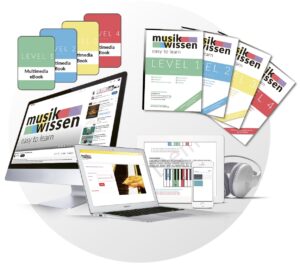Music knowledge trains the brain and ear
The flexible teaching aid "musik-wissen - easy to learn" teaches music theory online and/or with a textbook.

Music knowledge is a life's work. Who is well versed in all eras, who knows a composer's oeuvre in its entirety, who knows about genre boundaries and can provide similar information about Duke Ellington, Def Leppard or Johann Sebastian Bach? In view of the diversity, it's a good idea to start with the basics - the basics that The practical theory book for music lessons first published in 1997 by the now retired music teacher Emil Wallimann and the bandleader and music coach Peter Wespi.
Learning platform
Since 2015, both experts have been promoting an e-learning platform to accompany the book, available at www.musikwissen.ch. The target audience is - according to the book itself - "grammar school pupils, but also prospective conductors or music teachers". Anyone who studies the exercises will come up with other "customers": in addition to applicants to music academies or interested amateurs or pensioners, there are also long-time music editors or music journalists who might want to brush up on their theoretical knowledge. Well, what was that again about the enharmonic confusion? Where were the semitone steps in the Mixolydian mode again? Or: What does the bebop scale actually sound like in a minor key?
You can tell that the two long-standing educators have experience in teaching. And they make imaginative use of the diverse digital-interactive possibilities: The website and its respective pages are refreshingly clear and without fuss. There are audio examples (the ear training under the title "Eartraining" is particularly recommended), there are simple multiple-choice questions, as well as continuous texts to be completed. Once a learning unit has been completed, you move on to the next exercise. Motivating progress can be made quickly; a quick glance at the book or links to short information videos will help if you get stuck.
Insights into music history
The platform is divided into four levels of difficulty. If you have completed everything with a green tick, you have already achieved a very solid foundation in aspects of musical notation, rhythm, instrument, genre and form theory and harmony. The illustrative examples provide the learner with many an insight into music history en passant, which can of course be expanded upon. There is a brief mention of non-European music, as well as the 20th and 21st centuries, in which composers consciously abandoned traditional musical knowledge and traditional elements such as the circle of fifths, the rondo or the sonata form.
In times of blatant loss of musical education, this enthusiastically run and constantly updated learning platform remains an extremely useful initiative!
musik-wissen - easy to learn. Offers and conditions for individual users, schools, institutions and associations with printed workbook, multimedia eBook or e-learning at: musikwissen.ch/offer








